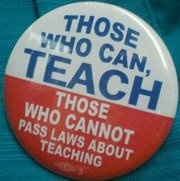I’m glad somebody said it….
We Need to Talk About Injustice
Economic status determines a lot for our children especially with the public school to prison pipeline being a very prevalent problem here in America. On the video above, Bryan Stevenson has a frank discussion about injustice in America.
How does our justice system reflect the inequalities of the public education system?
How can a true investment in a child’s education change the likelihood of them being found on the wrong side of justice?
While School Doors Close, Prison Cells Open
Four major cities are closing several schools next year: Philadelphia (23), New York City (23), The District of Columbia (15) and Chicago (54). I’ve often wondered what the ramifications might be for so many school closings aside from larger class sizes and already overwhelmed resources such as wrap around services (social workers, resource teachers, etc) being abused, and I found an article that outlined many more problems for districts in the future. Here, Education Week argues why closing so many schools only temporarily saves district budgets.
I also watched, “The House I Live In: Takes a Hard Look at the War on Drugs” yesterday on PBS and found that so much money goes into the war on drugs. With the privatization of the prison system, prisons in this country are looked at as more of an asset while our schools are considered liabilities. Convicting felons is a business that turns a profit. Hence why while the U.S. contains only 5% of the global population we have more 25% of the world’s prisoners. More money is invested in convicting non-violent offenders than educating our children. The lack of investment in education causes the overpopulation of our prisons. When are our priorities going to change?
Sir Ken Robinson: Changing the Education Paradigms
Those Who Can, TEACH
In matters of public education, it seems so many policy makers miss solutions completely because they are looking at the microscopic through a telescope. The problems are much more varied and complex than most people think. It’s like looking up and out for a world ending asteroid while a plague wipes out a whole generation.
Obama Proposal Raises Issue of Pre-K Teacher Prep
Obama Proposal Raises Issue of Pre-K Teacher Prep
Should Pre-K teachers be required to earn at least a Bachelor’s degree in order to be considered “highly qualified”?
They talk about the difference between being credentialed and keeping with good practice. If learning is a life-long journey, does earning credentials create a ceiling discouraging continuing education/professional development or does it motivate teachers to gain more knowledge through earning more credentials (degrees, endorsements, PLUs, etc)?
We are in desperate need of more Pre-K teachers. Do you think this new policy may discourage the recruitment and retention of current Pre-K teachers?
What’s your take on this? We’d love to hear your thoughts.

